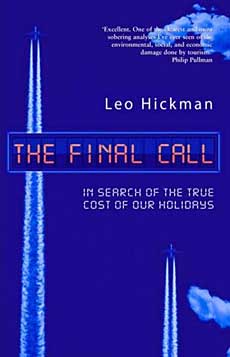As the relative cost of airfare declines and the number of daily flights soars, once exotic destinations are increasingly within reach of the average traveler. The world has become more accessible, with trips that once took days or weeks now made in the time it takes to have a cocktail and a nap. But what is the real cost to all of this convenient travel? How is tourism affecting culture, the environment and the future of the planet?
One of the travel industry’s biggest annual events, World Travel Market, takes place in London next week (November 7-10), with November 9 designated as World Responsible Tourism Day (WRTD). In one of WRTD’s most anticipated scheduled events, Leo Hickman, author of a widely debated book on sustainable tourism, takes the “hot seat” for what organizers are billing as a “contentious face-to-face discussion” with BBC World’s Stephen Sackur.
 Hickman’s book, The Final Call: Investigating Who Really Pays for Our Holidays (Transworld Publishers, 2008), takes a critical look at how tourism has already changed the world for the worse and the negative impact it will have if it continues to grow unchecked in the coming years. “Tourism is one of the world’s largest unregulated industries,” Hickman writes. Far from being a boon to locals, he notes, “[e]ven in developing countries, most of tourism is controlled by a small number of Western corporations.”
Hickman’s book, The Final Call: Investigating Who Really Pays for Our Holidays (Transworld Publishers, 2008), takes a critical look at how tourism has already changed the world for the worse and the negative impact it will have if it continues to grow unchecked in the coming years. “Tourism is one of the world’s largest unregulated industries,” Hickman writes. Far from being a boon to locals, he notes, “[e]ven in developing countries, most of tourism is controlled by a small number of Western corporations.”
Hickman, a journalist for The Guardian, lives in Cornwall, directly under the flight path of 500 planes that fly in and out of Heathrow airport every day. The noise pollution keeps him awake at night, counting passengers on planes instead of sheep. This sleeplessness turns his thoughts to tourism, specifically ecotourism, and the positive spin and aura it has developed. At its best, tourism is touted as a lucrative way for developing nations to make money. According to its proponents, it leads to job creation for locals, the development of infrastructure and the promotion of the host country’s unique culture and customs. But to its detractors, tourism promotes globalization, increases climate change and destroys the very cultures and nature that tourists spend billions of dollars each year to experience.
“What effect does our footfall have on places that are both environmentally and ecologically sensitive?” Hickman asks. “And just how much do the resident communities really have to gain economically from our stay?” To answer these questions, Hickman investigated several popular destinations across the globe. He interviewed resort owners, tourism ministers, housekeeping staff, sex workers, politicians and tourists. What he found is not exactly inspiring.
The problems Hickman discovered on his journeys include water shortages and coral bleaching in Mexico, child prostitutes in Thailand, human rights abuses against foreign workers in Dubai, melting glaciers in the Swiss Alps, cruise ships dumping waste into the Pacific, and a dangerous lack of sewage infrastructure across India, Spain, China, Costa Rica and Estonia. Meanwhile, many resorts and destinations are promoting ecotourism as a way to lure environmentally conscious tourists to these and other destinations. To Hickman, “ecotourism” is just another unregulated way to put a bandaid on a gaping wound. “Is there a term more used and abused in the tourism industry than ‘ecotourism’?” he asks. “What does it really mean? Are these tourists all ‘keenly involved in conservation issues,’ or are they on a holiday where the natural environment around them is just part of the entertainment?”
According to the United Nations World Tourism Organization stats cited in The Final Call, there will be over 1.6 billion annual “international tourism arrivals” by 2020. In his final chapter, Hickman encourages travelers to think seriously about how they travel and what each trip means for the planet, advising readers to stay home for their holidays or, barring that, to find more eco-friendly alternatives to air travel. Further, he strongly encourages countries to place caps on the number of tourists allowed to visit ecologically sensitive areas like reefs, mountaintops and coasts. To prevent these destinations from becoming exclusive playgrounds for the rich, he calls for a lottery-based quota system and free admission to locals.
“My travels through some of the world’s major destinations did not reassure me that the industry has a full grasp on how tourism can so often be a negative force,” Hickman writes. “This is not to say, though, that the future is one of total despondency – far from it. Encouragingly, there does seem to be growing acceptance and understanding by some within the industry that it is in grave dangers of trashing the very assets of which it depends to survive.”
Read Ethical Traveler's Reprint Policy.
